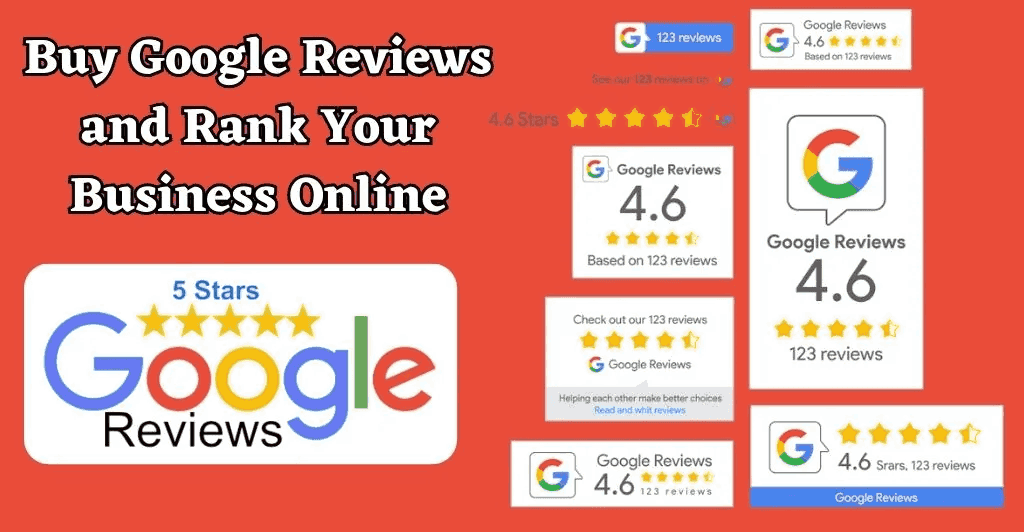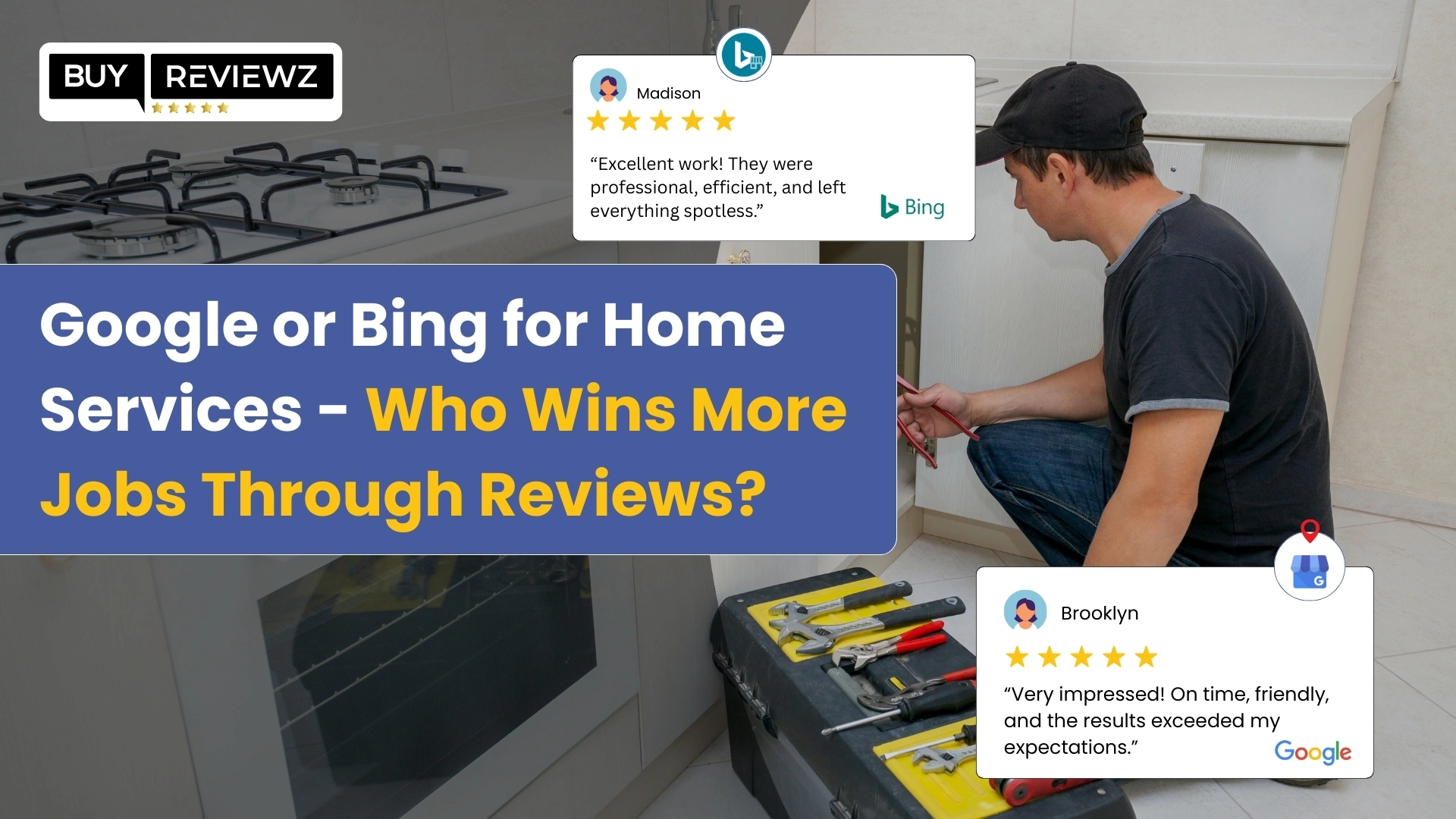As Google strives to provide the best search results for the query raised by several users, consumers trust online reviews, and review listings on Google are a powerful metric for determining the quality of your product or service.
A business profile with a massive count of positive reviews and feedback is bound to soar high in local search results.
Do you know 93% of users claim to affect their purchasing decision by reading good reviews?
Trying to trick your users is the worst idea you could think of. The fake Google reviews can be easily found by an experienced internet user and can damage your business's reputation. So you must be very cautious if you ever buy reviews from Google Reviews for your Google My Business account.
As you read this guide, we'll explain how you can boost your company's digital growth by buying Google reviews.
Let’s start with the basics.
Why Should Your Google My Business Page Rank High?
Below, we will go through the top reasons why you should aim to rank higher.
- Ranking on top of search engines boosts your business's authenticity and makes your business trustworthy.
- Increasing organic traffic more comprehensively will get you more visibility and, hence, more sales.
- The high ranking serves as the basis for making money through advertisements in search engines. 49% of marketers claim to have higher ROI through organic search.
- It is much more cost-effective than running a high-paid campaign to promote brand awareness.
Why Does Your Business Require an Online Presence?
Internet enthusiasts quickly and correctly comprehend your site's credibility by counting the 5-star ratings and online reviews your business has earned. This can help them come down to an informed decision of whether to avail of your services.
Therefore, being present online helps you reach a broader base of customers looking for better customer experience and customer support. This is especially important for various types of local businesses, as they can leverage these reviews to build trust in their community. However, don’t just limit yourself to one platform. Your business can also spread on other business review sites such as Yelp and Amazon to gain real reviews from real people.
What Does Raking Your Biz on Google Stand For?
Google Rank gives a better understanding of the position of the business in the market. It is directly proportional to the brand’s revenue and growth. Moreover, it reduces the efforts that go into digital marketing.
Take the example of Apple. It is the global market leader in smartphones. Without marketing, Apple can attract new customers and sustain itself for years.
Similarly, every small or large business and service provider should focus on ranking higher in the search engine by getting positive review feedback and 5-star Google reviews, although simultaneously staying away from bad reviews.
It not only drives more sales but also kills your competition. It also helps with easier reputation management, which is a huge plus.
Reasons Google Reviews are Important
Google Reviews are crucial for businesses because they help build credibility and trust with potential customers. The benefits of Google reviews for business are significant, as a strong rating can increase your visibility and set you apart from competitors.
- Source of Credibility
Only 2% of users have never read online reviews. This itself makes Google Reviews an enormous source of credibility for Google review services.
It effortlessly boosts your online reputation while shaping and defining the reason for your targeted audience. For example, the reviews from the customers often incorporate the reason they are posting such reviews. This helps others make informed decisions and take your business to a new scale.
Organizing a high-paid marketing campaign is optional to boost your review count. After using your services, you can simply ask your customers to leave a review.
Being humble can help your site gain more new reviews than ever. With the GMB page for your business listings, you make leaving a negative review, a no-sweat task. There is a direct link the clients can follow to leave a Google review about your business.
- Wider Online Exposure
Google Reviews undoubtedly increase your online exposure by improving SEO, especially local SEO. Although the Google search algorithm is a complex mechanism, Google reviews play a massive role in sorting the dynamics and ranking your business high.
Above all other complexities lies the user's feedback. A happy customer is a wealth for the business, and so are their reviews.
The star ratings and the number of reviews also play a huge role. Google, as well as the potential customers, relies on the number of positive reviews and how efficiently you have handled the negative reviews before deciding.
- Improves other Marketing Areas
Google Reviews are excellent in improving the happenings of the other marketing areas as well. Simply asking people to leave reviews of what they think regarding your services would help you improve the lacking areas.
And it eventually strengthens into a better business field. Not only this, but it can also help you understand the need for developing other services.
User experience through Google reviews can be the best free tool to shape and redesign your website appearance amongst viewers.
- Improves Transparency
You show how dedicated you are by making your online reviews visible to all and resolving any issues with dissatisfied customers with peace and expertise. You must reveal to your customers and potential customers how valuable each client is to you.
Do you know that 75% of businesses do not reply to their negative reviews? Take a competitive advantage by reverting to them with professionalism. Moreover, the Federal Trade Commission (FTC) actively tells enterprises to be transparent with customers; online reviews and social media are one of the best ways to showcase this.
- Use the Most Relevant Keywords
Keywords are words and phrases customers often use when searching for a product or service. You can boost your business tremendously by using these keywords that are likely to be searched for by customers.
Several Keyword Research Tools can help you position high in Google. You can either hunt down the prospective buyers and their dynamics of searching for your business-related servings or use such research tools to ease your job!
Using Keyword Research Tools can ease your work in several ways. By finding relevant keywords and infusing them with your services and products, you can ensure they are used correctly in your web pages and posts.
Search engines can display your website when users search for keywords related to your business.
Apart from using keyword research tools, you can also use Google Trends tools for hunting down the most popular target keyword.
Taking this step is essential because keywords' popularity and relevance change frequently. Therefore, a keyword that now grabs the target audience might not be that relevant a few months later. This helps you stay updated and well-versed with the current demands of the audience.
Five Ways How You Can Rank Your Business on Google
1. Make Your Business Sites Mobile Friendly
Your business site should have a user-friendly, flexible design for all devices. A person may search on a desktop, mobile, laptop, or another electronic device. Your business site must be well-aligned for landing in one go.
Work on the technicalities and improve the speed of displaying the landing page. Your potential customers may not return to your business website if your landing page is slow.
2. Be the Hero with Online Reviews
Google Reviews are the feedback customers leave on your site or google maps reviews after having your products or services. These can either be positive Google reviews or negative, depending on their user experience.
Understanding the importance of Google reviews for your business is key to leveraging them effectively. If you want to use the finest tool yet with no pinch in your pockets to boost your online reach, you can rely on Google Reviews.
These reviews are your marketing tool for reaching the target audience immediately and quickly!
3. Google Business Profile Should Be On Point
A Google Business Profile or GMB page is the most freely used tool to skyrocket the business online. It is used for online business listing through Google for free. It allows your business site to pop up in local search results in the most organic way, using methods of good optimization.
This well-optimized structure of your business listings would help you rank higher on Google or local search results and include every element of your site, including the internal links, content, to the number of positive reviews you gathered online.
Google occupies almost 85% of the search engine market. Therefore, you must either work towards creating a Google Business Profile by following a property guide or claim the business page if it already exists.
Depending upon the existence of your business page online, you can claim it to be yours and move with further verification or simply step up one for yourself.
Display your Google business page online whenever someone searches for a business related to your company, which would increase the visibility of your business online. Doing this activity will not only leave a lasting effect on the customer's mind, but the high ranking proves your frequent success in delivering excellent user experience while being authentic.
This is one of the best ways for small businesses willing to rank higher on Google.
Here Are Some Ways How You Can Optimize Your Profile -
- Include keywords in your content for the site in a very planned and strategic manner.
- Selecting the appropriate category for your business is the very next step. The category you choose for your business would add relevance to search results and shortlist your profile if people are looking for your services. Consider your business niche when selecting a category.
- Gathering online reviews can add to your authenticity and serve you in many ways. You should respond to the reviews, whether they are positive Google business reviews
- or negative, to add more value to the customer and strive for customer retention. 67% of happy customers will leave a Review on their own.
- Keep your site updated regularly, as by doing so, you follow the recent trends and keep your site optimized with updated content, images, data, and information relevant to your business.
4. Optimization is the Key
Google Ranking uses more than 200 factors to determine the rank of your page. So, once you own a business online, you must be very well-versed in the dynamics of SEO.
SEO or Search engine optimization uses structured search engine marketing (SEM) tactics known as Google ranking factors. 75% of marketers say that implementing SEO tactics is highly relevant in achieving the desired marketing goal.
Here, optimization of several fields within the web pages goes through. It encompasses the optimization of content on your page using the most seasonal and popular keywords, target keywords, the layout of your page, improvement of user experience through constant updates, and many more.
These optimizations might be reflected by factors like:
- Using attractive infographics on your webpage
- Changing the layout with more structured menu icons
- Speeding up the time of opening your site with a click
Slow-loading landing pages can be your biggest enemy. It can sway away the potential audience in one go.
Google pays immense value to the user experience in ranking businesses high in the search engine. Therefore, looking for scopes for further improvement in user experience can eventually aid you in ranking higher. Improving the website's content or working on your updated keywords is a far easier task than dealing with your site's technical delays, which sometimes require time.
Some Ways of Optimization:
- Use the targeted keywords to update your content regularly.
- Enhance the accessibility of your website so that it can serve customers from all spheres efficiently.
- Keep your site updated, as the Google algorithm is complex and frequently changing.
- Make your business niche clear and relevant through a polished and crisp post.
- Add links internally and backlogs of quality to land back on your site's pages.
5. Buy Google Reviews Online
The competition to get ranked higher online is getting more and more difficult as time progresses. But, with the advancement in technology, there always comes a solution.
Nowadays, various businesses are in the league to purchase Google reviews to create an impact on the local Search Engine Result Pages. Several websites are available to have customers read reviews and buy 5-star reviews while staying within the policy of Google.
The Last Few Words
As a business owner, you must improve your ranking by making the most of Google My Business reviews. Google reviews can skyrocket the reach of your local business online and boost the online rankings in a much more efficient way. The process is free and easy yet cost-effective.







 How Many Google Reviews Are Necessary For Your Business
How Many Google Reviews Are Necessary For Your Business
 7 Tips To Design Effective Google Review Cards For Business
7 Tips To Design Effective Google Review Cards For Business